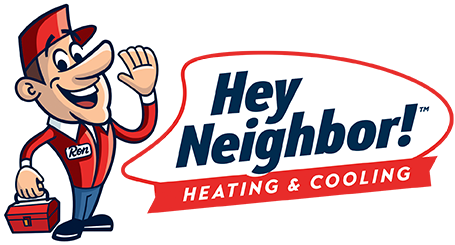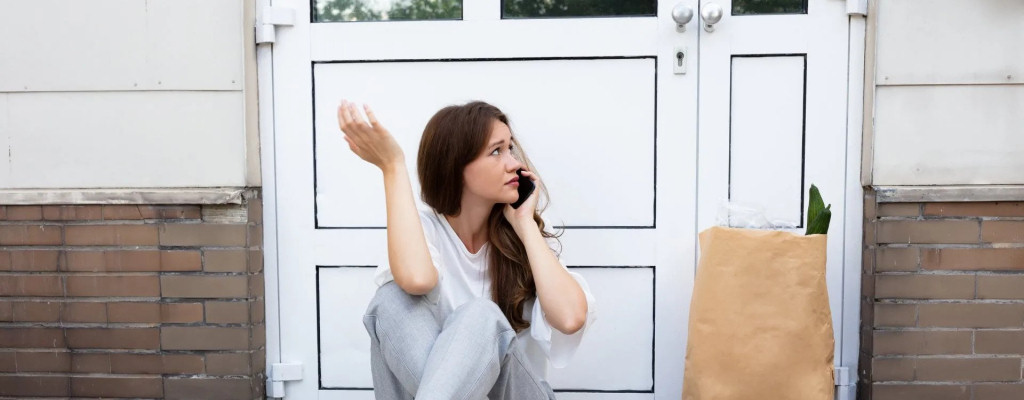A home emergency can happen suddenly, but good preparation and knowledge of how to handle them can prevent more headaches, further damage, and perhaps most importantly – more expenses. Whether you find yourself locked out of your house or having to replace an AC unit on the hottest day of the year, here’s how you can quickly and efficiently remedy these common household problems.
As any veteran homeowner can attest, owning a home brings with it unexpected twists and turns that are inconvenient and potentially expensive. Even when strictly following a home maintenance checklist, unexpected repairs and other home emergencies just happen. They’re almost unavoidable. Even so, a little preparation can keep a seemingly small home emergency from turning into a much larger, costly one.
Let’s explore four of the most common household issues and learn the ideal ways to handle them.
Home emergency #1: You’ve locked yourself out!
Being locked out of your house is a truly frustrating experience, but it’s happened to virtually all of us at some point. Let’s say you rush out the door in the morning and lock the front door from the inside as you leave. Moments later, you go to unlock your car and realize your car keys are now locked inside your house – along with your house key. Oh no!
Assuming there aren’t any open windows or ways to get inside, your first reaction might be to pick the lock or pry the door open. This is never a good idea. You’re likely to damage the lock and/or the door, which leads to a costly repair bill. It’ll also increase your frustration level and just makes the situation worse.
Instead of trying to get inside by damaging the lock, door, or a window, try these tips instead:
Is there a spare key? Most households have spare keys for each family member or to provide access to friends or neighbors while the family is out of town. In the event of a lock-out, your best bet is to call someone with a key. (Assuming you didn’t lock your phone in the house too!) It may be inconvenient – especially when it’s late at night – but it’s the fastest way to resolve this home emergency without causing damage. If you can’t access a spare key, take a deep breath and then call a professional.
Hire a professional locksmith. Don’t worry, neighbor! Locksmiths are all too familiar with home lock-outs. It’s probably what they’re called for most often. Most smiths offer home emergency services and will assist you any time, day or night. Because they have loads of experience and specialized tools, they’ll get you back into your house quickly and without causing damage to your lock or door. Of course, you will pay for the locksmith’s service, but this will spare you the frustration of trying to gain access on your own, along with repair or replacement costs if you break the lock or door in the process of breaking in.
Prepare for future lock-outs. While nobody means to lock themselves out of their homes, it’s better to be safe. Consider trusting a spare key with a neighbor or a nearby family member. Alternatively, tuck away a hide-a-key box or install a digital lock that uses a code or a fingerprint to grant access instead of a metal key. If you go with a smart lock, put a regular check of the lock’s batteries on your home maintenance checklist!
Home emergency #2: You’ve lost power!
Power outages are common during storms, accidents, road work, etc. Regardless of how diligent your home maintenance routine is, losing power is nearly always beyond a homeowner’s control. Even so, how you handle a power outage can significantly impact your safety and your wallet:
Check your power company’s outage webpage on your smartphone. If the outage isn’t widespread, call a professional electrician. We can’t stress this enough – never attempt to repair a home electrical issue on your own. It’s dangerous and can cause more damage. If the issue is limited to only your home, instead of a widespread outage, immediately have a qualified electrician visit to determine the problem and resolve it ASAP. In the meantime, while the power is out, here are two more best practices:
Keep your fridge closed. We’ve all been there. The power’s out, and it’s tempting to check the food inside your refrigerator after an hour or two without power. Don’t do this – keep your fridge door shut. Leaving the door closed keeps the cold air in and minimizes the chance of food spoilage for a short period. Even so, please remember that the Centers for Disease Control (CDC) recommends disposing of all food in the refrigerator for safety after four hours without power. If you know it’ll be an extended outage, a cooler filled with ice can extend the life of refrigerated foods beyond four hours. As for frozen foods, a full freezer will remain cold for up to 48 hours, while a half-full freezer has about 24 hours.
Unplug all electronics. Power surges can damage or destroy any device that’s still connected to an outlet. Avoid costly replacements by disconnecting all electronics. Even better, add surge protectors to protect these sensitive devices when outages happen in the future.
Home emergency #3: Your pipes are frozen!
Frozen pipes are a major issue that many folks in Northeast Ohio face each winter. When your pipes freeze, they can burst, which results in a costly repair and potentially thousands of dollars more in flood damage. Here’s how to handle this emergency:
Turn off the water at the main valve. If you don’t know where this valve is, then now is the time to find it – in the summer, long before you might have frozen pipes. Once you’ve located your home’s main water valve, inspect it to make sure it opens and closes correctly. Then, make a note of the valve’s location, so you’re not scrambling to remember where it is when you urgently need to find it.
Call a professional plumber. If your pipes are frozen or have burst, the very best thing to do is to call in a pro. They have access to the specialized tools needed to remedy the situation quickly without causing further damage to your home. They’ll also be happy to help you prevent your pipes from freezing in the future.
Winterize your home. To avert frozen pipes, prevention is key. Add home winterization to your seasonal maintenance checklist before those temperatures dip. This includes disconnecting garden hoses, draining the pool, and adding insulation to pipes in your attic, basement, or garage – all areas that are prone to freezing.
Home emergency #4: Your heating and cooling system isn’t working!
Whether in the heat of summer or the cold of winter, it’s vital that your heating and cooling system is up and running as well as possible. Mindfulness is the key to avoiding a breakdown that’ll leave you without air conditioning or cooling in your home:
Replace your filter and schedule professional maintenance. We say it often, but it bears repeating – you should replace your HVAC system’s filter at least every three months, but each month if you have pets or a large family. Likewise, make sure to schedule professional maintenance twice a year – once in the fall for your furnace, and once in the spring for your air conditioner. Also, be aware of any strange noises, smells, or sudden spikes in utility costs. These can indicate a severe problem. It’s best to call the neighborly HVAC experts at Hey Neighbor Heating & Cooling at the first signs of trouble to schedule a thorough inspection. We’ll spot minor issues before they become major, costly ones.
Go somewhere else, if possible. If your HVAC system fails during extreme winter weather or the height of summer’s heat, leave home if possible. Extreme heat or cold can be dangerous, especially for those with health challenges. Visit a neighbor, go to a movie, or head out to eat while you’re waiting for our technicians to arrive – which won’t be long!
Hire our professionals for HVAC system repair and replacement
Even with proper maintenance, your heating and cooling system won’t work forever. Like any machinery, an unexpected HVAC breakdown often occurs at the worst possible time. From your air conditioning unit suddenly failing during a heat wave to your furnace stopping during a blizzard, you can’t really predict when this home emergency will occur. However, repairing or replacing HVAC systems is a job for an HVAC expert – us! We’re your local Trane Comfort Specialist, and we’ll happily get your HVAC equipment up and running again, whether it can be repaired or needs replaced. We’ll ensure you’re ready for whatever home comfort emergency comes your way!


Comments are closed